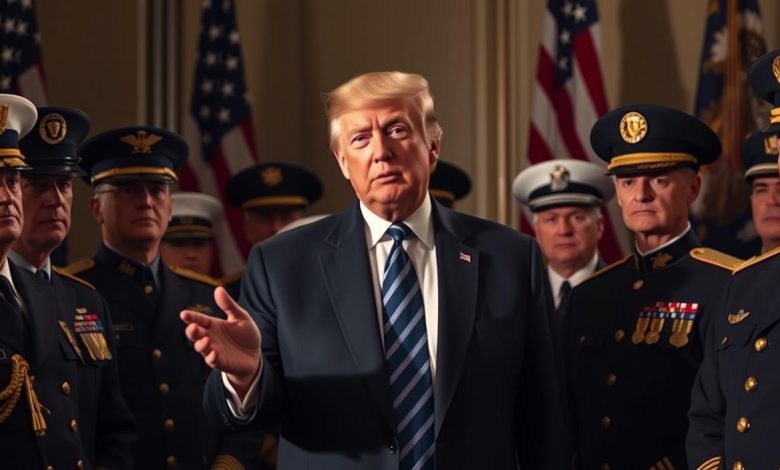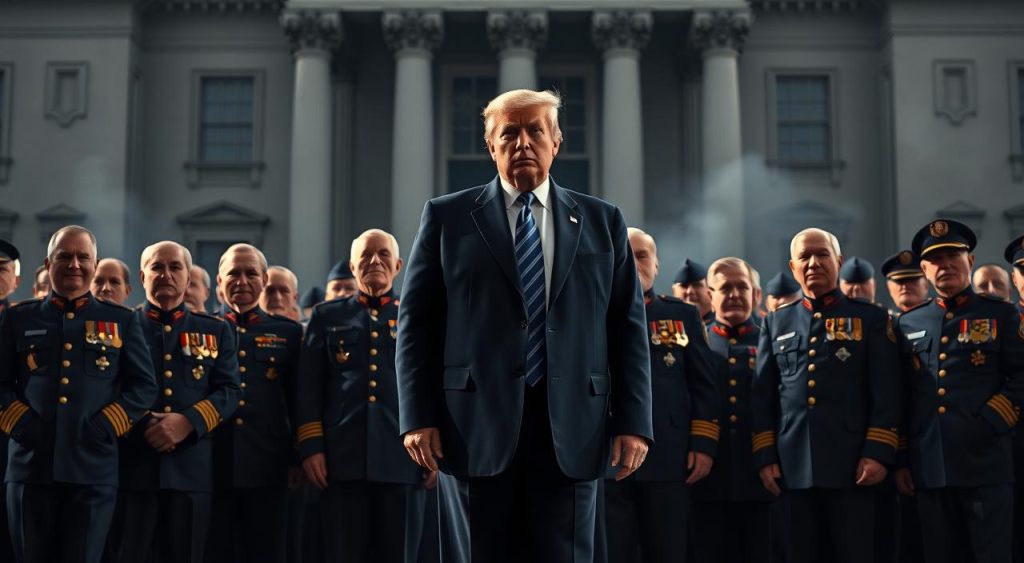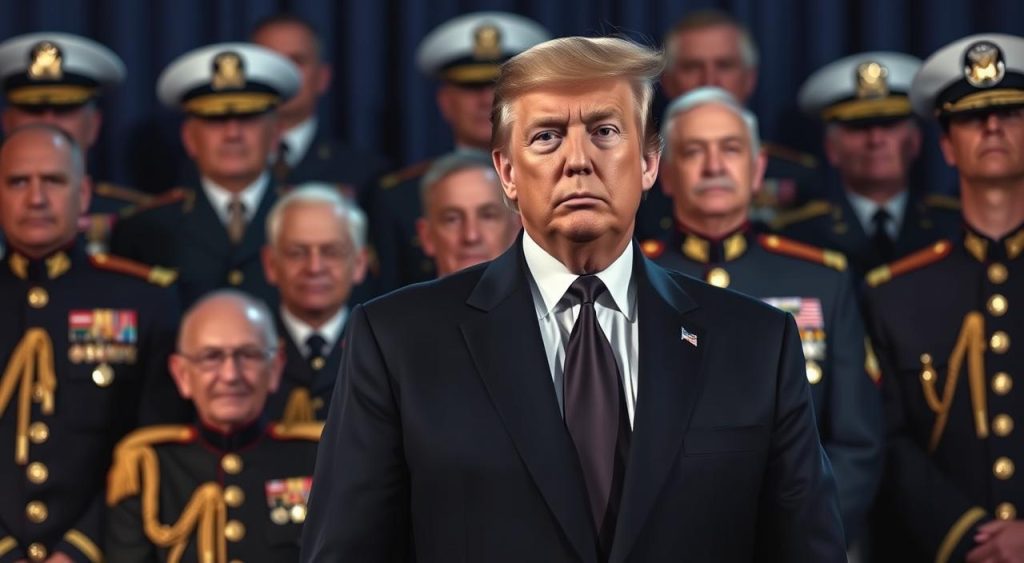Trump Brings Generals and Admirals into His Political Fold

Former President Trump has been making headlines with his strategic moves. He’s bringing high-ranking military officials into his political circle. This trump’s ominous move has sparked a lot of debate.
By adding generals and admirals to his team, Trump wants to boost his political standing. He hopes their credibility and influence will change public opinion. This move is seen as a big step in his political strategy.
Key Takeaways
- Trump is integrating military leaders into his political campaign.
- This move is perceived as a strategic effort to enhance his political credibility.
- The inclusion of generals and admirals is expected to impact public perception.
- Analysts are divided on the potential success of this political maneuver.
- The move underscores Trump’s efforts to strengthen his political base.
The Military Endorsement Announcement
Trump made a big move by announcing support from top military leaders. This was a key step in his campaign. It showed he was gaining support from important military figures.

Timeline of Trump’s Military Recruitment
Trump started recruiting military people early in his campaign. Key figures like retired generals and admirals were among those who supported him. This support grew over time, leading to the big announcement.
Initial Public and Media Reactions
People had mixed feelings about the military support for Trump. Some saw it as a big win for his campaign. Others worried about the implications of military figures in politics.
The media talked a lot about how this could affect Trump’s campaign. They also discussed the bigger picture for how the military and politics interact.
Trump’s Ominous Move to Recruit Generals and Admirals to His Political Cause
Donald Trump has made a bold move by recruiting top military officers to support him. This move is meant to boost his image on defense and national security. It has caused a lot of debate across the country.

The “Generals for Trump” Coalition Formation
The “Generals for Trump” coalition is a key part of Trump’s campaign. It brings together retired generals and admirals who back Trump. They use their military experience to help Trump win trust.
This group is made up of different military veterans. Each one brings their own experience and views. They help counter criticism of Trump’s policies on veterans and national security.
Campaign Strategy Behind Military Recruitment
The Trump campaign wants to show strength and security by recruiting military leaders. By linking with these officers, the campaign shows Trump’s dedication to national defense. This is to attract voters who value security and military readiness.
The recruitment of generals and admirals also helps answer criticism of Trump’s past comments on the military. Their presence in the campaign shows Trump’s strong support for military issues.
Profiles of Prominent Military Figures Supporting Trump
Trump has attracted many respected generals and admirals to his campaign. This has brought a lot of media attention. It also shows Trump’s strong stance on defense and national security.
Retired Four-Star Generals in Trump’s Camp
Several retired four-star generals have endorsed Trump. They bring a lot of military experience. This experience helps strengthen Trump’s defense credentials.
Admirals Joining the Political Movement
Admirals have also joined Trump’s campaign. They bring their knowledge of naval operations and leadership. Their support shows Trump’s policies appeal to many in the military.
Former Defense Officials Aligning with Trump
Not just generals and admirals, but also former defense officials support Trump. They have held important roles in past administrations. They offer valuable insights into defense policy and national security.
The support of these military figures is a big win for Trump. It shows his efforts to build a strong team with different backgrounds and skills.
Breaking Tradition: The Norm of Military Neutrality
Trump’s campaign has included high-ranking military officers. This breaks a long-standing norm of military neutrality. For decades, the military stayed out of politics, following the principle of civilian control.
Historical Separation of Military and Politics
In the United States, there’s always been a clear line between military service and politics. This line comes from the country’s founding and the Constitution. It ensures the military supports and defends the Constitution, staying neutral in politics.
The table below highlights key milestones in the historical separation of military and politics:
| Year | Event | Significance |
|---|---|---|
| 1787 | Constitutional Convention | Established civilian control over the military |
| 1947 | National Security Act | Restructured military and defense organizations |
| 1960s | Vietnam War protests | Military involvement in political discourse increased |
Evolution of Military Involvement in Political Campaigns
Over time, the military’s role in politics has changed. While the military itself stays neutral, individual leaders have spoken out more. Trump’s move to recruit generals and admirals is a big step in this direction.
This shift raises important questions. It makes us think about the future of civil-military relations and the military’s role in American politics.
Motivations Behind Military Support
The support of Trump by top military leaders has caused a lot of debate. It’s important to understand why they back him. This helps us see how their support affects Trump’s campaign.
Policy Alignments on Defense and Foreign Affairs
Many military leaders support Trump because of their policy views. They come from backgrounds in defense and national security. Trump’s policies match theirs in these areas.
- Support for increased military spending
- Agreement on counter-terrorism strategies
- Shared views on national security priorities
Personal and Professional Relationships with Trump
Personal and professional ties to Trump also matter. Some military leaders know Trump well. They might have worked with him before or share similar views.
These connections can make them feel loyal to Trump. It encourages them to support his campaign.
Opposition Within Military Circles
Trump is trying to get more military leaders to support him, but many retired officers disagree. They worry about mixing politics with military duties. This shows a big problem between politics and keeping the military out of it.
Retired Officers Speak Out
Many retired military leaders are worried about politics getting too close to the military. They think Trump’s plan to get generals and admirals involved is wrong. It goes against the idea of the military staying neutral.
A group of retired generals and admirals even spoke out against Trump. They said his actions could hurt the military’s good name.
Pentagon Leadership Responses
The Pentagon’s leaders are careful. They stress the need for the military to stay out of politics.
Here’s a table showing what retired officers and Pentagon leaders said about Trump’s plans:
| Group | Statement |
|---|---|
| Retired Generals and Admirals | Publicly denounced Trump’s recruitment efforts, citing potential damage to the military’s non-partisan reputation. |
| Pentagon Leadership | Emphasized the importance of maintaining military neutrality in political affairs. |
The pushback against Trump’s military recruitment shows deep concerns. People worry about politics affecting the military and how it might change the relationship between the military and society.
Constitutional and Ethical Implications
Trump’s plan to use generals and admirals in his campaign has sparked a lot of debate. It raises big questions about the military’s role in politics.
Civilian Control of Military Principle
The idea that civilians control the military is key to American democracy. This idea makes sure the military answers to the government, not the other way around. Trump’s actions blur the line between military and politics, challenging this principle.
Regulations on Political Activity by Military Personnel
The military has rules about political activities. The Department of Defense Directive 1344.10 says active-duty troops can’t join campaigns. But retired troops can, making Trump’s move a bit unclear.
Ethical Debates Within National Security Community
The national security world is worried about Trump’s moves. Here’s a look at different views:
| Perspective | Concerns | Implications |
|---|---|---|
| Pro-Trump | Support for Trump’s policies | Enhanced political legitimacy |
| Anti-Trump | Politicization of the military | Erosion of civilian control |
| Neutral | Maintaining military neutrality | Preservation of democratic norms |
The argument over Trump’s use of military leaders shows the complex mix of military and politics. As things develop, watching how it affects American democracy is key.
Historical Precedents in American Politics
American history shows many times when military leaders backed presidential candidates. This trend still goes on today. Military endorsements have greatly influenced how people see candidates and who wins elections.
Past Presidential Campaigns with Military Endorsements
Many U.S. presidential campaigns have gotten support from top military leaders. For example, in 2008, General David Petraeus’s support helped John McCain a lot. In 2016, a group called “Generals for Trump” backed Donald Trump, showing their support.
Comparisons to Civil-Military Relations in Other Democracies
In countries like the U.K. and France, military leaders don’t usually endorse candidates. They keep their military and political lives separate. But in the U.S., military leaders often speak out in politics. This shows how different the U.S. is from other democracies.
Impact on Military Institutions and Culture
Trump’s push for military endorsements is changing the military’s culture. The recruitment of top military officers is sparking a big debate. People are worried about how this might change the military’s role in society.
Concerns from Defense Policy Experts
Defense experts are worried that Trump’s efforts could make the military political. They see generals and admirals joining campaigns as a big change from the military’s usual neutrality.
Potential Effects on Military Cohesion and Trust
Adding military leaders to Trump’s campaign is making some question the military’s unity and trust. A table below shows the possible effects:
| Aspect | Potential Impact |
|---|---|
| Military Cohesion | Reduced unity due to political divisions |
| Trust in Leadership | Erosion of trust among service members |
| Civil-Military Relations | Blurring of lines between military and politics |
Long-term Consequences for Civil-Military Relations
The long-term effects of Trump’s recruitment on civil-military relations are being debated. Experts fear that mixing politics and the military could harm democracy.
Public Perception and Electoral Impact
People have mixed feelings about Trump’s plan to get military leaders to support him. His use of generals and admirals to boost his campaign is both praised and criticized.
Polling Data on Military Endorsements’ Influence
Recent polls show mixed views on military support for Trump. Some polls say that endorsements from top military leaders can help undecided voters, especially those who care about national security.
A well-known poll found that 62% of respondents see Trump’s military efforts positively. On the other hand, 31% worry about the military being politicized.
Demographic Analysis of Voter Response
Voter reactions to Trump’s military support plan vary by group. For example, those from military families and conservatives often back Trump. But, liberals and those against military in politics are more skeptical.
The ‘Generals for Trump’ and ‘Admirals for Trump’ movements could sway voters, especially in states with many veterans.
Democratic and Republican Responses
Trump’s plan to recruit military figures for his political cause has caused a stir. Some see it as Trump’s ominous move to grow his political support. But, opinions vary widely across the political spectrum.
Biden Administration and Democratic Leadership Reactions
The Biden administration and Democrats are worried about Trump’s move. They think it’s a way to politicize the military, which could harm its neutrality. A Democratic National Committee spokesperson said, “Using the military for political gain is dangerous and un-American.”
Support and Criticism from Within Republican Circles
Republicans have mixed feelings about Trump’s plan. Some see it as a smart way to boost his political strength through political recruitment. Others worry it could damage trust in the military. A few Republican senators support it, saying it aligns with trump political cause and will help in the elections.
This shows the complex issues Trump’s decision raises for both parties.
Conclusion: Democracy at a Crossroads
Trump’s push to get generals and admirals involved in his politics is big news. The “Generals for Trump” and “Admirals for Trump” movements have started a big debate. People are wondering if the military should play a role in politics.
Trump’s move to bring in top military leaders is changing how we see things. It’s making it harder to tell who’s in charge. Some say it could change how people vote.
Many are worried about the rules and ethics of this action. They fear it could mess up the balance between the military and civilians. The situation is very serious, and it’s making everyone think about democracy’s future.
